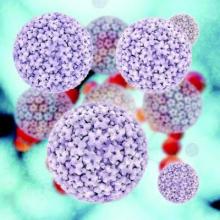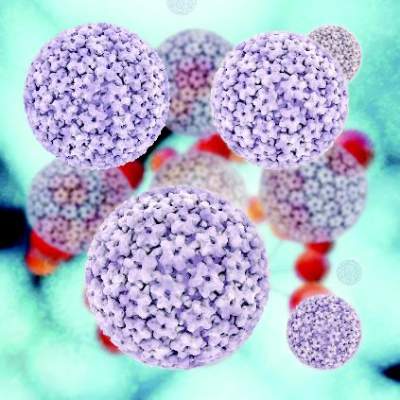User login
The incidence of human papillomavirus–associated cancers is increasing in the United States, but many of these cases could be prevented by the HPV vaccine, investigators from the Centers for Disease Control and Prevention report.
Between 2008 and 2012 the incidence of HPV-associated cancers was 11.7/100,000 persons, up from 10.8/100,000 persons during the previous 4-year period, according to data from population-based cancer registries. An average of 38,793 HPV-associated cancers were diagnosed in the most recent period, 30,700 (79%) of which can be attributed to HPV. Of those, 28,500 cancers are of HPV types that are preventable with the 9-valent HPV vaccine, reported Laura J. Viens, MD, and her associates.
Among the HPV-associated cancers, an average of 11,7771 cervical cancer cases were diagnosed each year. Rates of cervical cancer per 100,000 persons were higher among blacks (9.2) than among whites (7.1), and among Hispanics (9.7) than non-Hispanics (7.1).
“Increasing [HPV] vaccination coverage could decrease the cancer incidence and disparities in the United States,” the investigators concluded.
Find the full report from Morbidity and Mortality Weekly Report here
The incidence of human papillomavirus–associated cancers is increasing in the United States, but many of these cases could be prevented by the HPV vaccine, investigators from the Centers for Disease Control and Prevention report.
Between 2008 and 2012 the incidence of HPV-associated cancers was 11.7/100,000 persons, up from 10.8/100,000 persons during the previous 4-year period, according to data from population-based cancer registries. An average of 38,793 HPV-associated cancers were diagnosed in the most recent period, 30,700 (79%) of which can be attributed to HPV. Of those, 28,500 cancers are of HPV types that are preventable with the 9-valent HPV vaccine, reported Laura J. Viens, MD, and her associates.
Among the HPV-associated cancers, an average of 11,7771 cervical cancer cases were diagnosed each year. Rates of cervical cancer per 100,000 persons were higher among blacks (9.2) than among whites (7.1), and among Hispanics (9.7) than non-Hispanics (7.1).
“Increasing [HPV] vaccination coverage could decrease the cancer incidence and disparities in the United States,” the investigators concluded.
Find the full report from Morbidity and Mortality Weekly Report here
The incidence of human papillomavirus–associated cancers is increasing in the United States, but many of these cases could be prevented by the HPV vaccine, investigators from the Centers for Disease Control and Prevention report.
Between 2008 and 2012 the incidence of HPV-associated cancers was 11.7/100,000 persons, up from 10.8/100,000 persons during the previous 4-year period, according to data from population-based cancer registries. An average of 38,793 HPV-associated cancers were diagnosed in the most recent period, 30,700 (79%) of which can be attributed to HPV. Of those, 28,500 cancers are of HPV types that are preventable with the 9-valent HPV vaccine, reported Laura J. Viens, MD, and her associates.
Among the HPV-associated cancers, an average of 11,7771 cervical cancer cases were diagnosed each year. Rates of cervical cancer per 100,000 persons were higher among blacks (9.2) than among whites (7.1), and among Hispanics (9.7) than non-Hispanics (7.1).
“Increasing [HPV] vaccination coverage could decrease the cancer incidence and disparities in the United States,” the investigators concluded.
Find the full report from Morbidity and Mortality Weekly Report here
FROM MORBIDITY AND MORTALITY WEEKLY REPORT

